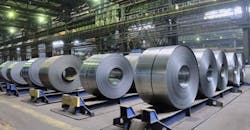The steel tariffs are having a dramatic impact on the industry as demonstrated by the latest American Steel Index report issued on Oct. 26.
The report, published by Business Forward, compares the prices American manufacturers and their foreign competitors pay for hot- and cold-rolled steel.
Since President Trump announced his plans for steel and aluminum tariffs in February, prices in the U.S. for hot- and cold-rolled steel have risen 13.5% and 8.9%, respectively.
During that same time, prices in the UK, Italy, China, Germany and Japan are down 4.6% and 4.9%, respectively.
As a result, U.S. manufacturers are paying 15.8% more for hot- and cold-rolled steel, on average.
The dollar difference between steel prices in the U.S. and in competing markets has nearly doubled since February (1.79 times larger).
This price discrepancy is hurting manufacturing. The group estimates that the increase in U.S. prices alone could wipe out 22% of a manufacturer’s profit (assuming steel represents 20% of its total costs and profit margin is 10%).
“Putting steelmakers ahead of manufacturers is backfiring,” said Business Forward President Jim Doyle. “Companies that buy steel employ 46 times more workers across the U.S. than companies that produce steel.” Business Forward is active in over 125 cities and has worked with more than 600 mayors, governors, members of Congress, and senior Administration officials.
The issue of employment is at the heart of the concern of this group. They point out that The Tax Foundation, which has measured the potential impact of both new and threatened tariffs, estimates that GDP could fall by $148 billion employment could fall by 459,816.
Looking at the overall economic impact the group points out that “tariffs raise prices and reduce the quantity of goods and services for U.S. businesses and consumers. This reduces income, employment, and economic output.”
About the Author
IW Staff
Find contact information for the IndustryWeek staff: Contact IndustryWeek
